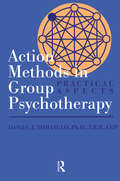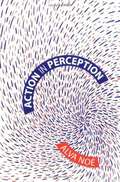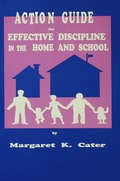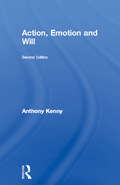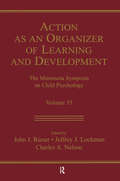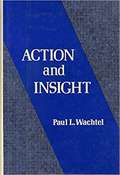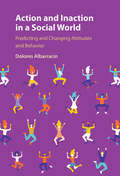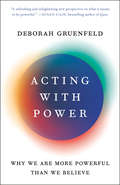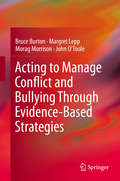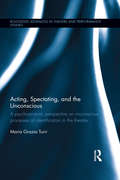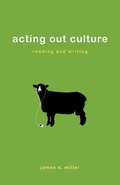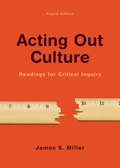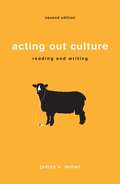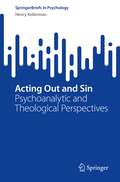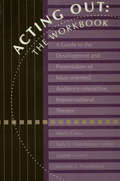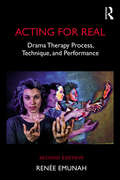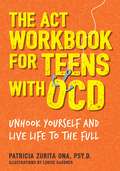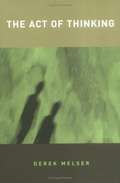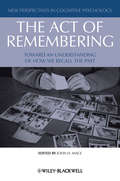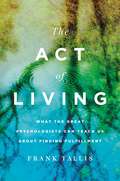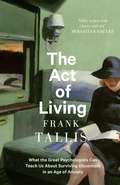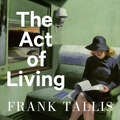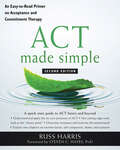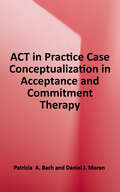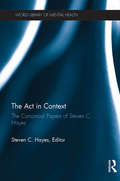- Table View
- List View
Action Methods In Group Psychotherapy: Practical Aspects
by Daniel J. TomasuloFirst published in 1999. Routledge is an imprint of Taylor & Francis, an informa company.
Action in Perception
by Alva Noë"Perception is not something that happens to us, or in us," writes Alva Noë. "It is something we do." In Action in Perception, Noë argues that perception and perceptual consciousness depend on capacities for action and thought -- that perception is a kind of thoughtful activity. Touch, not vision, should be our model for perception. Perception is not a process in the brain, but a kind of skillful activity of the body as a whole. We enact our perceptual experience.
Action Guide For Effective Discipline In The Home And School
by Margaret K. CaterFirst published in 1992. This Action Guide is for individual or group study of the book Effective Discipline in the Home and School by Genevieve Painter and Ray Corsini. This book assists parents, teachers, and counselors in training children so that home and school will be happy and efficient, organized but pleasant -- with adults satisfied with their children and children growing up to be respectful, responsible, and resourceful. It provides solutions and emphasizes practicality.
Action, Emotion and Will: 1963 Edition
by Anthony Kenny Dr Anthony KennyAction, Emotion and Will was first published in 1963, when it was one of the first books to provoke serious interest in the emotions and philosophy of human action. Almost forty years on, Anthony Kenny's account of action and emotion is still essential reading for anyone interested in these topics.The first part of the book takes an historical look at the emotions in the work of Descartes, Locke and particularly Hume. In the second part, Kenny moves on to discuss some of the experimental work on the emotions by 20th Century psychologists like William James. Separate chapters cover feelings, motives, desire and pleasure. This edition features a brand new preface by the author.
Action As An Organizer of Learning and Development: Volume 33 in the Minnesota Symposium on Child Psychology Series (Minnesota Symposia on Child Psychology Series #Vol. 33)
by Charles A. Nelson John J. Rieser Jeffrey J. LockmanThis is the 33rd volume in the Minnesota Symposium on Child Psychology held in October 2002. The symposium was held to honor the scientific and mentoring contributions of Anne Danielson Pick and Herbert L. Pick, Jr.--two longtime and beloved professors of the Institute of Child Development. It focused on "Action as an Organizer of Learning and Development" and integrated the best and most innovative research on the role of action in perceiving and understanding. Taken together, the book captures the intellectual excitement that characterized the 33rd symposium and appeals to developmental psychologists, particularly those interested in perceptual development.
Action and Insight
by Paul L. WachtelThe publication of this set of selected papers provides an opportunity to reflect on the compass of this work. It offers me, as well as the reader, the chance to reflect on the main themes and how they interact, and to consider the underlying as¬sumptions that have energized and, inevitably, limited the work. It affords as well a chance to consider the important questions that remain unanswered and how they might be pursued.
Action and Inaction in a Social World: Predicting and Changing Attitudes and Behavior
by Dolores AlbarracínThis book explains how actions and inactions arise and change in social contexts, including social media and face-to-face communication. Its multidisciplinary perspective covers research from psychology, communication, public health, business studies, and environmental sciences. The reader can use this cutting-edge approach to design and interpret effects of behavioral change interventions as well as replicate the materials and methods implemented to study them. The author provides an organized set of principles that take the reader from the formation of attitudes and goals, to the structure of action and inaction. It also reflects on how cognitive processes explain excesses of action while inaction persists elsewhere. This practical guide summarises the best practices persuasion and behavioral interventions to promote changes in health, consumer, and social behaviors.
Acting with Power: Why We Are More Powerful Than We Believe
by Deborah GruenfeldThere is so much we get wrong about power. This eye-opening look at the true nature of power explores who has it, what it looks like, and the role it plays in our lives.&“A refreshing and enlightening new perspective on what it means to be powerful.&”—Susan Cain, bestselling author of QuietGrounded in over two decades&’ worth of scientific research and inspired by the popular class of the same name at Stanford&’s Graduate School of Business, Acting with Power offers a new and eye-opening paradigm that overturns everything we thought we knew about the nature of power. Although we all feel powerless sometimes, we have more power than we tend to believe. That&’s because power exists in every relationship, by virtue of the roles we play in others&’ lives. But it isn&’t a function of status or hierarchy. Rather, it&’s about how much we are needed, and the degree to which we fulfill our responsibilities. Power isn&’t a tool for self-enhancement or a resource for personal consumption. It&’s a part you play in someone else&’s story. We often assume that power flows to those with the loudest voice or the most commanding presence in the room. But, in fact, true power is often much quieter and more deferential than we realize. Moreover, it&’s not just how much power we have but how we use it that determines how powerful we actually are. Actors aren&’t the only ones who play roles for a living. Like actors, we all make choices about how to use the power that comes with our given circumstances. We aren&’t always cast in the roles we desire—or the ones we feel prepared to play. Some of us struggle to step up and be taken more seriously, while others have trouble standing back and ceding the spotlight. Some of us are used to hearing we are too aggressive, while others are constantly being told we are too nice. Deborah Gruenfeld shows how we can all get more comfortable with power by adopting an actor&’s mindset. We all know what it looks like to use power badly. This book is about how to use power well.
Acting to Manage Conflict and Bullying Through Evidence-Based Strategies
by Bruce Burton Margret Lepp Morag Morrison John O'TooleThis book offers a complete and detailed account of the evolution of an internationally successful, evidence-based program that has been the result of almost two decades of action research into conflict and bullying. It addresses one of the most serious problems encountered in schools and work places worldwide: that of bullying and inter-personal conflict. The book presents a comprehensive account of the research, development and refinement of the DRACON Project and the Acting Against Bullying and Cooling Conflicts programs. The effective strategies that emerged from the extensive international research and practice use a combination of theories of conflict and bullying management with drama techniques and peer teaching which have been unique in their application. The book analyses their evolution into an effective program that has impacted positively on bullying and conflict in a number of settings. In the UK the program successfully addressed behavioural problems amongst girls in schools through the use of peer teaching in a drama setting. In Sweden the program assists nursing students, nurses and other health professionals to deal with conflict in the workplace. In Australia it has been applied in hundreds of schools to reduce bullying and assist newly arrived refugees to deal with cultural conflict and develop resilience and self- identity in their new country. This volume makes a major and authentic contribution to the international effort to find effective strategies and techniques to deal with interpersonal conflict and bullying across a range of contexts.
Acting, Spectating and the Unconscious: A psychoanalytic perspective on unconscious mechanisms of identification in spectating and acting in the theatre. (Routledge Advances in Theatre & Performance Studies)
by Maria Grazia TurriFrom Aristotle’s theory of tragic katharsis onwards, theorists of the theatre have long engaged with the question of what spectatorship entails. This question has, directly or indirectly, often been extended to the investigation of acting. Acting, Spectating, and the Unconscious approaches the unconscious aspects of spectatorship and acting afresh. Interweaving psychoanalytic descriptions of processes such as transference, unconscious phantasy, and alpha-function with an in-depth survey of theories of spectating and acting from thinkers such as Brecht, Diderot, Rousseau and Plato, Maria Grazia Turri offers a significant insight into the emotions inherent in both the art of the actor, and the spectator’s experience. A compelling investigation of the unconscious communication between spectators and actors, this volume is a must-read for students and scholars fascinated by theatre spectatorship.
Acting Out Culture: Reading and Writing
by James S. Miller"Acting Out Culture" is the first thematic composition reader to focus students' attention beyond what rules and norms govern their everyday behavior to "how" the rules themselves have been shaped over time.
Acting Out Culture
by James S. MillerCultural messages bombard students daily, laden with unstated rules about what makes our work valuable, our bodies ideal, our connections meaningful. Acting Out Culture empowers students to critically read those messages and use writing to speak back to their culture and question its rules. This book appeals especially to those students who are not full participants in the dominant culture, as well as to their instructors, who want to help students see how subtle (and not so subtle) cultural forces can shape their lives--and how they can challenge and resist those forces. The new edition of Acting Out Culture builds on that success, with provocative readings (more than 50 percent of them new) that challenge the rules we live by; pedagogical tools to encourage students to read, think, and write critically about their culture; and instructional support featuring sample syllabi, additional discussion topics, and ideas for teaching with visuals and online content.
Acting Out Culture: Reading and Writing (Second Edition)
by James S. MillerStudents are bombarded every day with media messages laden with rules: what makes our work valuable, our bodies ideal, our communities picture perfect. Acting Out Culture empowers students to use writing to speak back to their culture and question its rules. Featuring fresh readings by writers who lay bare and challenge the rules we live by, the second edition of Acting Out Culture gives students the tools they need to analyze and write critically about assumptions at the heart of cultural norms.
Acting Out and Sin: Psychoanalytic and Theological Perspectives (SpringerBriefs in Psychology)
by Henry KellermanThis brief treatise explores the common threads to psychoanalytic thought and theological theory. It uses a psychoanalytic lens to examine Judeo/Christian concepts of individual will, consciousness and the unconscious, and the apparent confounding idea of sin. What is new is that the definition of sin is revealed as a psychoanalytic translation of acting-out. Focusing on the behavior of acting-out it illuminates ideas that are part of Western cultural tradition providing insights to those interested in the psychology, and its history and philosophy. As such, it is a highly relevant work for psychologists, psychiatrists, and psychoanalysts, as well as for a comparative study of psychoanalytic and theological intersecting structures.
Acting Out: A Guide To The Development And Presentation Of Issue-Oriented, Audience- interactive, improvisational theatre
by Mario Cossa Sally Ember Lauren Glass Jennifer RussellThis handbook offers a compilation of background information, techniques and scenarios based on the Acting Out programme that offers theatre skills/counselling for groups of adolescents, free of charge. AO teens become performers, creating issues-oriented, audience-interactive, improvizational scenes with a variety of audiences.; Written for leaders who are familiar with improvizational theatre and working with groups, Part 1 discusses the importance of leader training, experience and intention. Psychodrama, sociodrama and theatre scenework are explained in some detail, with references offered for those who wish to learn more about these areas before proceeding. Information about group selection criteria, procedures and techniques for using the scenarios complete this section.; Part Two offers a set of eight topics each with its own list of scenarios. Each scenario begins with information about characters, settings and situations, and offerrs acting notes as well as age- appropriaeteness. A list of resources appears at the beginning of each thematic set of scenarios.
Acting For Real: Drama Therapy Process, Technique, And Performance
by Renée EmunahThis second edition takes the reader further into the heart of using drama for healing. Dr. Emunah offers an expanded understanding of her Integrative Five Phase model, a foundational approach that embraces the wide spectrum of possibilities within the playing field of drama therapy. Grounded by compassionate clinical examples, including ones that reach over time into deep-seated issues, the book offers tools for action-oriented treatment, embodied therapeutic interventions, and creatively engaging a wide variety of clients. This comprehensive text also contains over 120 techniques, categorized by phases in the session and treatment series, and subcategorized by therapeutic objective. Process-oriented drama therapy with group and individuals, as well as performance-oriented forms, are described in vivid detail. New to the second edition is an exploration of drama therapy outside of the clinical arena, including dramatic methods in family life and parenting, and drama therapy geared toward social change.
The ACT Workbook for Teens with OCD: Unhook Yourself and Live Life to the Full
by Patricia Zurita Psy.DThis workbook, based on Acceptance and Commitment Therapy (ACT) and Exposure Response Prevention (ERP), teaches teens with OCD new skills to handle the stream of pesky obsessions that show up in their mind.It presents the Choice Point - a tool to help teens choose how to handle those tricky moments when dealing with unwanted thoughts. Chapter by chapter, teens learn powerful skills to unhook from their obsessions, including exposure exercises and strategies for accepting their emotions, and complete activities to help them overcome their compulsions, avoidant behaviors, and requests for accommodations. With real-life examples and tons of fun activities, this workbook shows that fears, worry and nervousness are a part of life and gives teens the skills to choose how to respond to their obsessions and move towards the stuff they really care about. Making applying ACT and ERP skills fun, it encourages them to face their fears and live life to the full.
The Act of Thinking
by Derek MelserMelser argues that the core assumption of both folk psychology and cognitive science that thinking goes on in the head is mistaken. He argues that thinking is not an intracranial process of any kind, mental or neural, but is rather a learned action of the person.
The Act of Remembering: Toward an Understanding of How We Recall the Past (New Perspectives in Cognitive Psychology #3)
by John H. MaceThe first volume devoted solely to autobiographical memory retrieval, The Act of Remembering serves as a primer of ideas, methodology, and central topics, and lays the groundwork for future research in the field. Contains new, forward-looking theories from leading international scholars Answers questions such as: Do we retrieve memories according to when and where we need them? How much conscious control do we have over what we remember? Why are some people more likely than others to have intrusive ‘flashbacks’ following a stressful event? Pays particular attention to voluntary and involuntary recall
The Act of Living: What the Great Psychologists Can Teach Us About Finding Fulfillment
by Frank TallisLife and its meaning is a mystery almost impossible to solve, but what can the leading theories teach us about the search for purpose?For most of us, the major questions of life continue to perplex: Who am I? Why am I here? How should I live? In the late nineteenth century, a class of thinkers emerged who made solving these problems central to their work. They understood that human questions demand human answers and that without understanding what it means to be human, there are no answers.Through the biographies and theories of luminaries ranging from Sigmund Freud to Erich Fromm, Frank Tallis show us how to think about companionship and parenting, identity and aging, and much more. Accessible yet erudite, The Act of Living is essential reading for anyone seeking answers to life's biggest questions.
The Act of Living: What the Great Psychologists Can Teach Us About Surviving Discontent in an Age of Anxiety
by Frank Tallis'Tallis writes with clarity and wit' Sebastian FaulksScience, technology and western liberal democracy have all had a dramatic impact on our quality of life. Compared to previous generations, we have unprecedented access to information, increased personal freedom, more material comforts and more possessions. Yet, even before the shock of Covid-19, more people than ever before were reporting being depressed, anxious or unfulfilled. As our material circumstances become easier, life seems to get harder. Why should this be? Shelves sag under the weight of self-help manuals and the internet is awash with the advice of role-models and celebrity gurus; however, to what extent can these sources be expected to supply meaningful, practical answers - the kind of answers relevant to sceptical individuals living in a modern, technologically advanced culture? For over a hundred years, psychotherapists have been developing and refining models of the human mind. They have endeavoured to alleviate distress and they have offered help to people who want to make better life choices. Although the clinical provenance of psychotherapy is important, the legacy of psychotherapy has much wider relevance. It can offer original perspectives on the big questions usually entrusted to philosophers and representative of faith: Who am I? Why am I here? How should I live?In this compelling and important book, the principle contributions of the outstanding figures associated with the practice of psychotherapy are explained: from Freud to Ellis, Jung to Laing, Adler to Hayes. Viewed as a single, cohesive intellectual tradition, Frank Tallis argues that psychotherapeutic thinking is an immensely valuable and under exploited resource.
The Act of Living: What the Great Psychologists Can Teach Us About Surviving Discontent in an Age of Anxiety
by Frank Tallis'Tallis writes with clarity and wit' Sebastian FaulksScience, technology and western liberal democracy have all had a dramatic impact on our quality of life. Compared to previous generations, we have unprecedented access to information, increased personal freedom, more material comforts and more possessions. Yet, even before the shock of Covid-19, more people than ever before were reporting being depressed, anxious or unfulfilled. As our material circumstances become easier, life seems to get harder. Why should this be? Shelves sag under the weight of self-help manuals and the internet is awash with the advice of role-models and celebrity gurus; however, to what extent can these sources be expected to supply meaningful, practical answers - the kind of answers relevant to sceptical individuals living in a modern, technologically advanced culture? For over a hundred years, psychotherapists have been developing and refining models of the human mind. They have endeavoured to alleviate distress and they have offered help to people who want to make better life choices. Although the clinical provenance of psychotherapy is important, the legacy of psychotherapy has much wider relevance. It can offer original perspectives on the big questions usually entrusted to philosophers and representative of faith: Who am I? Why am I here? How should I live?In this compelling and important book, the principle contributions of the outstanding figures associated with the practice of psychotherapy are explained: from Freud to Ellis, Jung to Laing, Adler to Hayes. Viewed as a single, cohesive intellectual tradition, Frank Tallis argues that psychotherapeutic thinking is an immensely valuable and under exploited resource.
ACT Made Simple: An Easy-to-read Primer On Acceptance and Commitment Therapy (The New Harbinger Made Simple)
by Russ Harris Steven C. HayesNow fully-revised and updated, this second edition of ACT Made Simple includes new information and chapters on self-compassion, flexible perspective taking, working with trauma, and more. <p><p> Why is it so hard to be happy? Why is life so difficult? Why do humans suffer so much? And what can we realistically do about it? No matter how rewarding your job, as a mental health professional, you may sometimes feel helpless in the face of these questions. You are also well aware of the challenges and frustrations that can present during therapy. <p><p> If you’re looking for ways to optimize your client sessions, consider joining the many thousands of therapists and life coaches worldwide who are learning acceptance and commitment therapy (ACT). With a focus on mindfulness, client values, and a commitment to change, ACT is proven-effective in treating depression, anxiety, stress, addictions, eating disorders, schizophrenia, borderline personality disorder (BPD), and myriad other psychological issues. It’s also a revolutionary new way to view the human condition—packed full of exciting new tools, techniques, and strategies for promoting profound behavioral change.
Act in Practice: Case Conceptualization in Acceptance and Commitment Therapy
by Patricia A. Bach Daniel J. MoranAcceptance and commitment therapy (ACT) is more than just a set of techniques for structuring psychotherapeutic treatment; it also offers a new, insightful, transdiagnostic approach to case conceptualization and to mental health in general. Learn to put this popular new psychotherapeutic model to work in your practice with this book, the first guide that explains how to do case conceptualization within an ACT framework. ACT in Practice offers an introduction to ACT, an overview of its impact, and a brief introduction to the six core processes of ACT treatment--the six points of the hexaflex model and its pathological alter ego, the so-called inflexahex. It describes how to accomplish case conceptualizations in general and offers précis of the literature that establish the importance and value of case conceptualization. This guide also offers possible alternative case conceptualization for cases from different therapeutic traditions, a great help to therapists who come from a more traditional CBT background. Exercises throughout help you to evaluate the information you have just learned so that you may effectively integrate ACT into your practice.
The Act in Context: The Canonical Papers of Steven C. Hayes (World Library of Mental Health)
by Steven C. HayesThe Canonical Papers of Steven C. Hayes is a compilation of his most pivotal articles written from 1982-2012. Through these selected papers, Hayes again revisits the theoretical struggles between behavioral and cognitive-behavior theories, taking us from the 1980s into present day, discussing the breakthroughs and follies. Using this as a focus point, he discusses the tradition of behavior analysis and its difficulties in addressing human language and cognition. Moving forward into the 90s, he chronicles the changes in a behavioral approach that emerge from a contextual perspective on human cognition, and lays out the foundation for a contextual behavioral science approach that he argues is more likely to lead to an understanding of human action and an alleviation of human suffering. Although the articles have previously been published, they have been edited and compiled ensure this branch of research is clear to the modern audience. The compilation was chosen by Dr. Hayes to enhance his vision for a functional contextual approach to complex human behavior.
